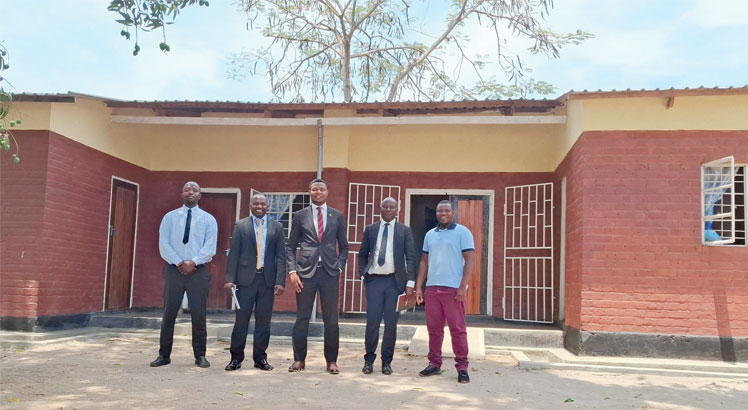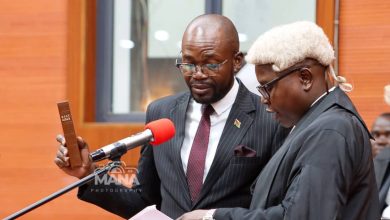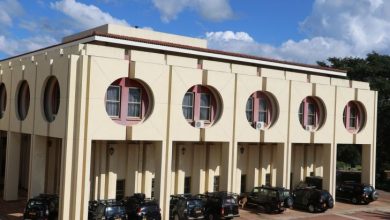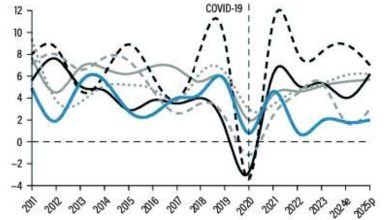Bureau takes legal aid to Nkhata Bay
In May this year, murmurs erupted in the interiors of Mzuzu Courthouse when senior resident magistrate Godfrey Nyirenda acquitted three police officers accused of taking bribes in exchange for police bail.
The Anti-Corruption Bureau (ACB) had arrested Aubrey Mwakhwawa, Luka Sikelo and Gift Manda of Chiputula Police Unit on September 17 2020 for allegedly demanding money from several complainants.
However, the wagging tongues in the courtroom gallery were stunned that even salaried law enforcers, set free due to contradictory evidence from seven State witnesses, required State-sponsored lawyers from the Legal Aid Bureau for fair trial.
“If accused persons on government payroll cannot afford a lawyer, what about you and I, the ordinary folk?” asked an observer outside the courtroom.
The trio, exonerated of corrupt practices by public servants and abuse of office, were represented by the bureau’s senior advocate Kelvin Nyasulu alongside Martin Kumwenda.
They are among few Malawians who not only know where and how to get free and subsidised legal aid when it matters most, but can get help within their localities.

district legal aid office. l James Chavula
The onlooker’s question amplifies rising calls for the Legal Aid Bureau to bring such assistance close to poor and vulnerable Malawians who cannot afford a lawyer.
Rules approved by the Chief Justice, Minister of Justice and Malawi Law Society’s Remuneration Committee this year show that a lawyer with less than 10 years’ experience bills K55 000 hourly while a more experienced legal practitioner costs K15 000 more. Senior counsels, decorated by the President, bill K80 000.
Nevertheless, the needy, especially in unreached remote areas where most Malawians live, bear hidden costs for transport and stays in urban areas where the bureau’s lawyers are confined.
The law
The bureau was established 10 years ago in compliance with the Legal Aid Act of 2011 to help people who cannot afford lawyers.
Section three of the law requires the bureau to help the indigent and vulnerable people in need of the legal services.
In March this year, it commemorated the 10th anniversary of serving the nation and expanding its reach beyond city bounds.
The decade-long expansion includes four regional branches situated in Lilongwe, Blantyre, Mzuzu and Zomba as well as 18 district offices.
However, Nkhata Bay, Likoma Island, Chikwawa, Neno and Mwanza remained unreached by the close of the decade of humble beginnings.
Last week, Nkhata Bay opened the bureau’s newest district office, a first since the 10th anniversary when its director Chimwemwe Chithope-Mwale made a bold proclamation: “It is the bureau’s first position that with adequate resources, it has the potential to surpass its current milestones.
“Our journey to bring justice closer and closest to the grassroots continues.”
To Chithope-Mwale, accessible legal representation for all is the fountain of protection of many human rights.
“Professional legal support ensures that ordinary Malawians receive fair treatment in the justice system,” he says.
The Constitution guarantees accused persons’ right to fair trial by competent courts.
Section 42 of the supreme law requires every accused person, for fair trial, “to be represented by a legal practitioner of his or her choice or, where it is required in the interests of justice, to be provided with legal representation at the expense of the State and to be informed of these rights.”
From an abandoned government building falling apart to a revolving door for low-earning Malawians yearning for legal assistance, the making of the bureau’s 23rd office was funded by the European Union’s Justice and Accountability Programme, alternatively known as Chilungamo.
Chithope-Mwale waxes lyrical: “As of July 2024, the building was in ruins. Now, those ruins have been transformed into a small theatre of justice—a place where indigent and vulnerable Malawians can access legal aid services.
“It gives me abundant joy that the bureau has grown rapidly. We began our operations in March 2015 with just three offices—in Blantyre, Lilongwe and Mzuzu. In January 2018, we added the Zomba office. Now we have 23 offices across 22 districts, all in effort to bring justice closer—and closest—to the people who need it most. That’s 20 new offices in just 10 years.”
Calls for more
But the bureau has about 50 lawyers supporting the country’s population of about 21 million, it reports. Currently, each lawyer handles approximately 500 cases, which the bureau’s spokesperson John Namalenga termed “ impossible”.
The overwhelmed legal minds are handling about 27 000 cases nationwide—a call for more investiment for the fast-expanding bureau to effectively serve Malawians, especially those beyond towns and cities where the State-sponsored lawyers live.
“Many Malawians cannot afford private lawyers, so we need to ensure that we are adequately supporting the Legal Aid Bureau,” said lawmaker Noel Lipipa when Parliament’s Legal Affairs Committee approved more funding for the bureau.
The major winners include low-income earners who bear the brunt of miscarriage of justice in the absence of lawyers.
In Zomba, Tella Msume, represented by the bureau’s lawyer Zaheed Ndeketa, swayed the High Court to quash his 21 years’ imprisonment for abducting and defiling a minor in Mpunga location.
In the verdict, Judge Texious Masoamphambe observed that the lower court erred in its judgement by disregarding a logbook, duly signed by the guard’s employer, which proved that the accused was on duty at Finca Bank when the alleged incident occurred.
Catholic Commission for Justice and Peace (CCJP) of Karonga Diocese has urged Chitipa District Grievance Redress Mechanism Committee members to promote the right to food in Traditional Authority Mwenewenya in the district.
The commission’s national coordinator Lewis Msiyadungu said this on Wednesday during the training of the committee, adding that it will be the first point to receive and resolve matters pertaining to access to food.
“We are expecting all the grievances and conflicts that will arise at community level to be amicably resolved,” said Msiyadungu.
Chitipa District Council director of economic planning and development Phillimon Maseko commended CCJP for training the committee on how to resolve complaints on food access or distribution.
The project, among others, seeks to ensure that people receive relief food items in time or are able to access food without challenges and consume the food the area produces.
Janet Kaira, a community member, said sometimes the area does not or receives relief food late due to poor road network.
“We ask duty-bearers to plan properly when deciding to dispatch relief food to the area. We also ask authorities to ensure fair distribution of relief food,” she said.
Last month, CCJP drilled community members in T/A Mwenewenya to promote people’s right to food as well as embark on nutrition sensitisation activities.
The 30 trainees were drawn from Wenya Community Action Group and Wenya Area Development Committee.
CCJP is running Right to Food Project with support from Weilthungerhilfe.





